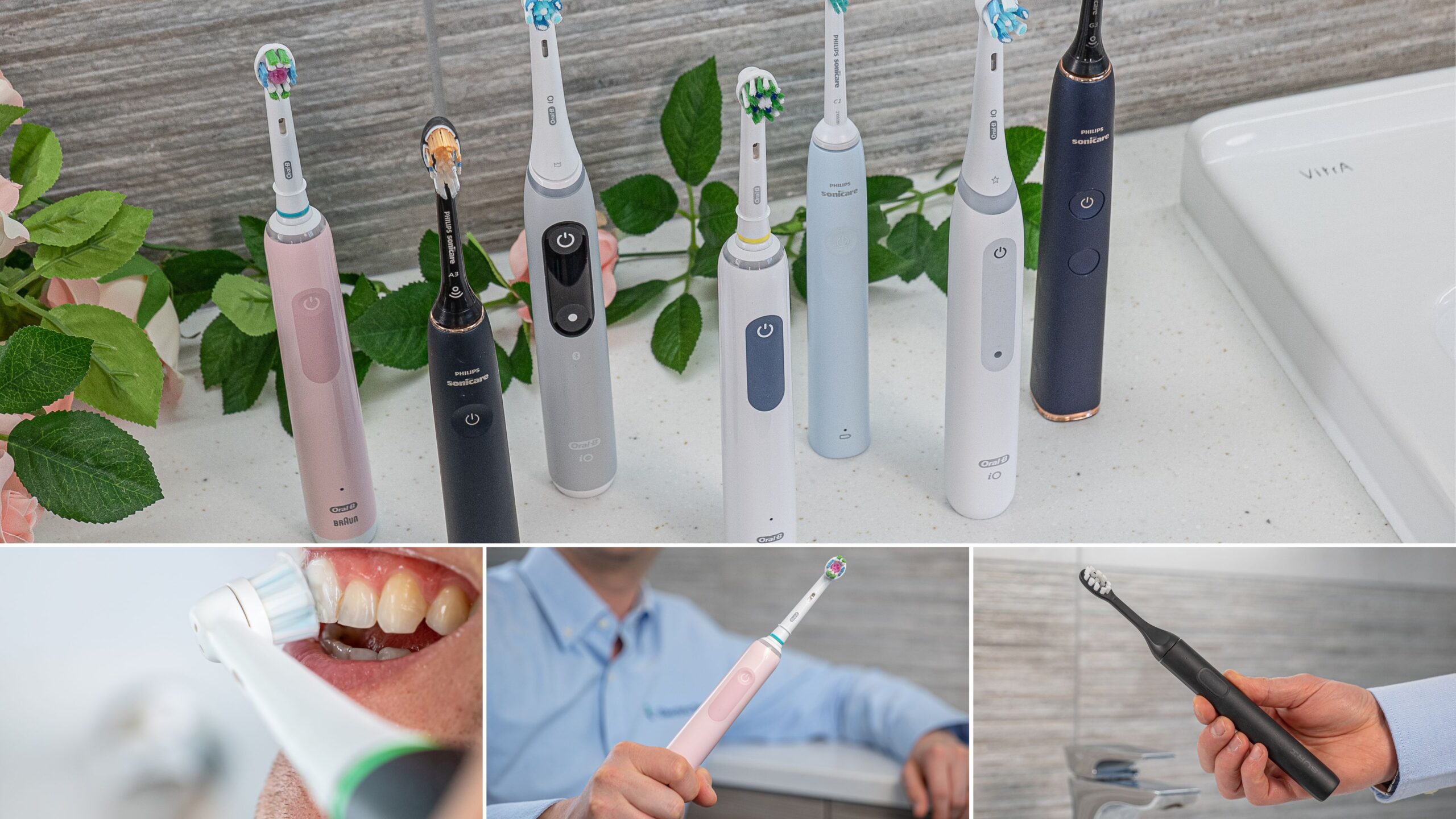
Our recommendations
Best overall: Oral-B Pro 3000 / Amazon, Shaver Shop / ~$84.99
Runner up: Oral-B iO3 / Shaver Shop / ~$99
Environmental choice: SURI / SURI / ~$160
Top of the range: Sonicare Prestige 9900 / Amazon, Shaver Shop / ~$534.51
Best budget: Oral-B Pro 100 / Shaver Shop, Amazon / ~$39
Best for sensitivity: ProtectiveClean 4300 / Amazon, Shaver Shop / ~$119
How we tested
We specialise in reviewing dental health products and we’ve been consistently testing them since Electric Teeth launched 8 years ago.
When a new brush is released, we buy it, test it and compare it to what’s already available. We then update our reviews and recommendations accordingly. We publish in-depth written and video reviews to share our findings and opinions.
We’ve included the most relevant details below, but we go into more depth in our detailed hands-on reviews. To make our recommendations, we test and consider the features that dentists recommend as the most important: a pressure sensor, timer and pacer.
But we also take into account the finer details like how easy it is to keep a brush clean, how difficult the heads are to pull on and off, and whether or not it’s easy to accidentally turn the brush off during use. You can find out more about our testing process here. Not only do we test products ourselves, but we take on feedback from our community. We have open comment sections and a popular YouTube channel.
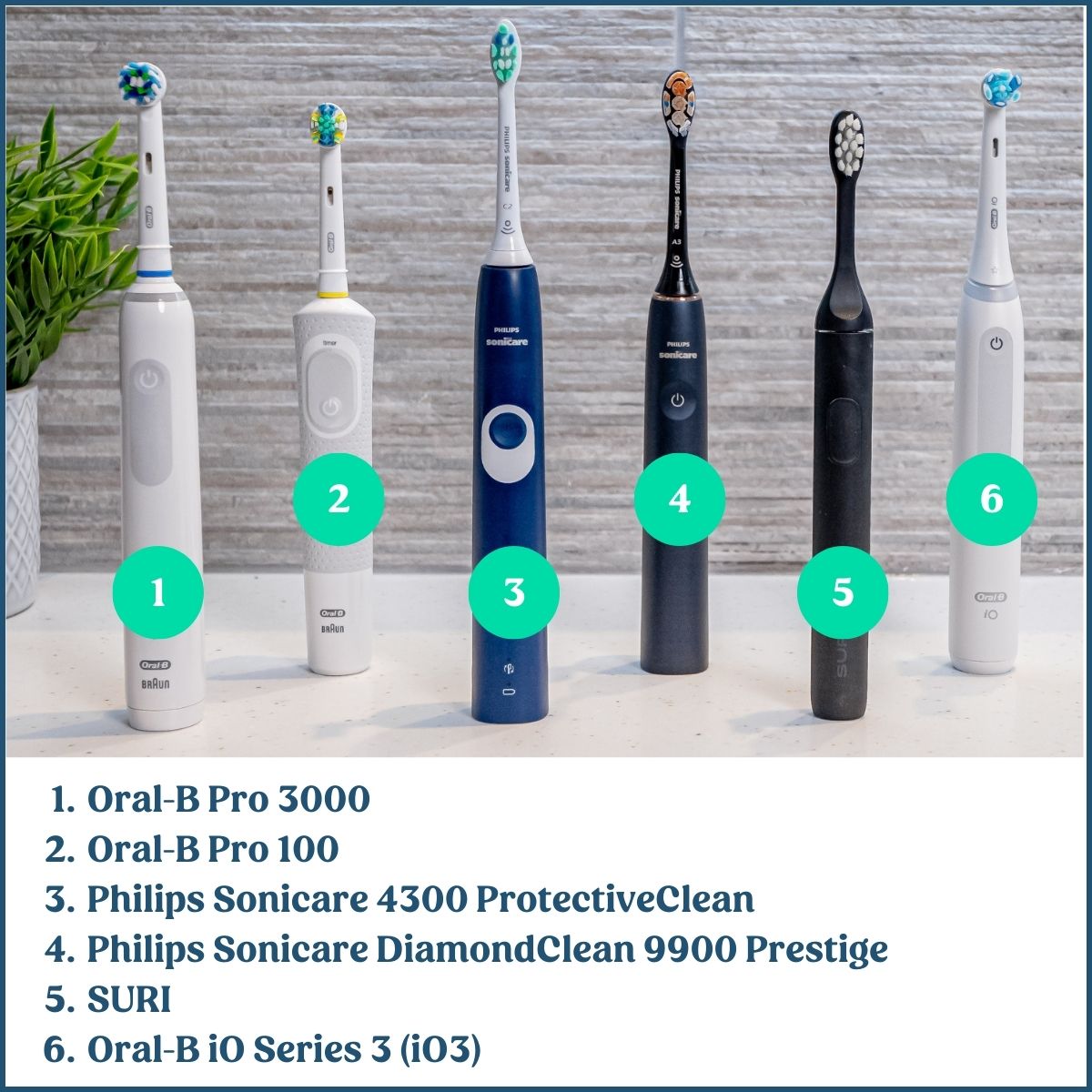
What to look for, what to avoid
We explain these points in more detail later on, but before you make a choice, here are the key things you should know to avoid spending too much or too little.
Keep these in mind as you browse our recommendations below and keep reading for more insights from our testing:
Best overall
The Oral-B Pro 3000 and the iO3 are what we regard as the best brushes for the majority of users. They've got the key features, but don't inflate the price with unnecessary extras.
Oral-B Pro 3000
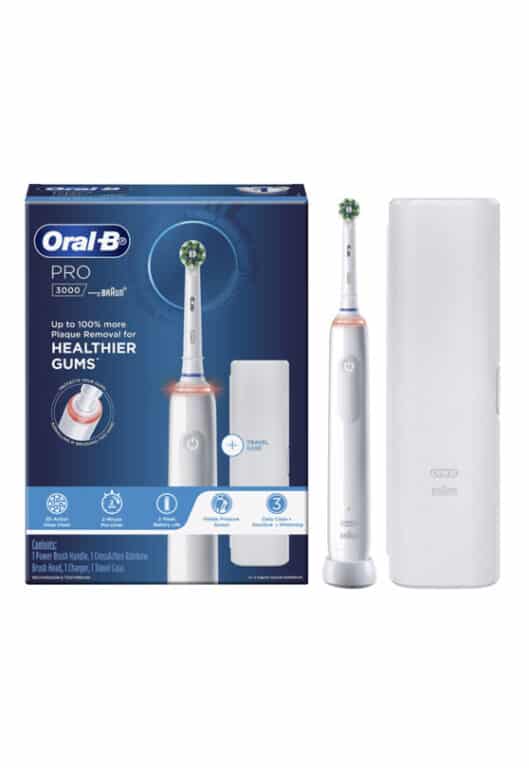
Cleaning modes: 3 | Battery life: 14+ days | Bluetooth: No | Noise: 78dB | Head cost: $7 | Cost to own - 3 yrs: $177
Who it's for:
Someone who wants a reliable brush with dentist-recommended features (a timer, a pacer and a pressure sensor) for a fair price.
Why it's our main choice:
It has the essential features you need and not lots of unnecessary extras. Replacement brush heads are affordable too.
We love the cleaning results the Pro 3000 gives. After each brushing session, our teeth felt like they had just had a scale and polish at the dentist.
More on why we chose it...
We’ve found that because the toothbrush doesn’t turn off automatically, we often brush for a bit longer than the recommended 2 minutes.
Having tested many brushes, we know that they will, over time, be left with toothpaste residue and gunk on the head and handle. In this respect, the Pro 3000 is one of the easiest brushes to keep clean — a quick rinse or wipe is all you need. Although there’s a bit of texture to the back of the handle, it’s not as grippy as a soft touch rubber grip, particularly when wet. Unless you struggle to hold things, it’s not a big issue.
A minor annoyance is the lack of cleaning mode labels on the handle. You don’t know what mode is selected unless you learn the order or the sound. It always defaults to Daily Clean. If you want a different mode, you’ve got to press the power buttons multiple times.
At 78 decibels it's one of the louder brushes we’ve tested, although typical for Oral-B. If you’re brushing whilst someone sleeps, you’ll want to shut the door. The vast majority of brushes operate at 60-70dB. Unless you have a need for a very quiet brush (see our recommendations below), this isn’t a big issue.
Read our Oral-B Pro 3 3000 review.
What we like |
Worth noting |
|---|---|

Easy to keep clean |
No cleaning mode icons/labels |

Small round brush head cleans the teeth well |
Defaults to the daily clean mode |

Dentist recommended features |
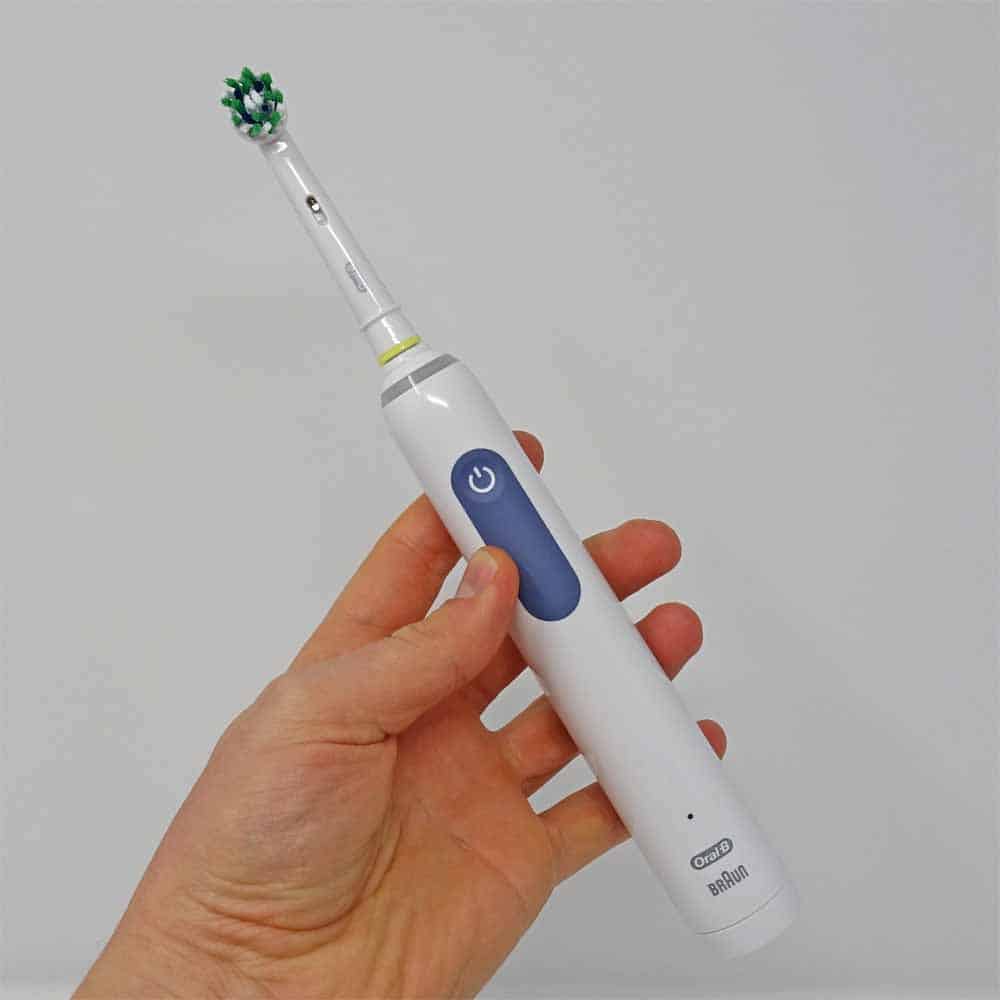
Runner up
Oral-B iO3
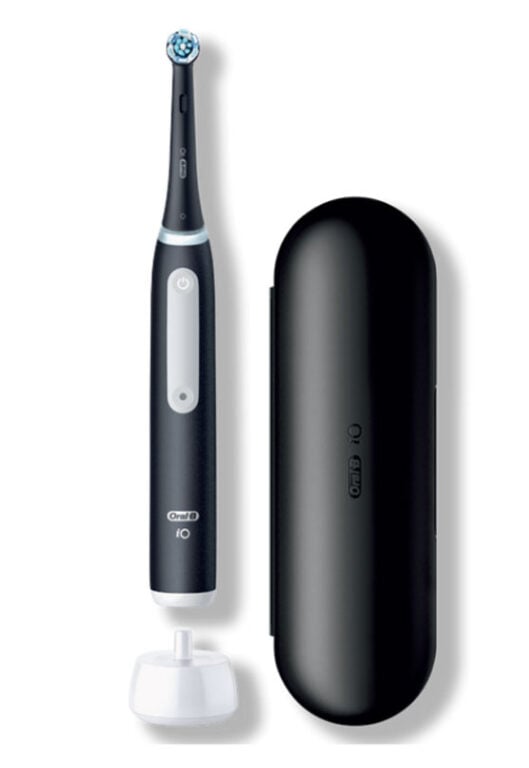
Cleaning modes: 3 | Battery life: 14 days | Bluetooth: No | Noise: 64dB | Head cost: $18 | Cost to own - 3 yrs: $297
Who it's for:
Someone who knows they brush too hard.
Why we picked it:
We found the brushing experience softer and quieter than the Pro 3000. The pressure sensor is also more useful.
Based on our testing, it doesn’t clean the teeth any better than the Pro 3000. Given the more expensive price of the iO3, the Pro 3 is the better value purchase.
More on why we recommend it...
Exclusive to the iO Series is an advanced pressure sensor. We particularly like how it shows with a green light when you’re applying the correct pressure, rather than just showing a red LED when you brush too hard. The iO is the only range that has a pressure sensor like this.
Whilst we don’t quite agree, we understand the sentiment when readers say the Pro 3000 feels like a jackhammer in the mouth. The iO3 feels quite a bit different in that respect; it’s far less aggressive and we found it noticeably softer on the teeth when brushing. If you’ve got gum recession or tooth sensitivity, the iO3 is a good choice.
It’s noticeable how much quieter the iO3 is compared to the Pro 3000 — 64 decibels compared to 78. It’s less mechanical sounding, which is more pleasant. The matt finish to the iO3 handle creates a smarter looking brush than the gloss plastic found on many other Oral-B models.
Letting the iO range down is the cost of replacement brush heads. Although the iO3 is the cheapest model in the range, it still requires iO-specific refills. These are around 2 times the cost of those for non-iO brushes like the Pro 3. We do prefer the feel of iO brush heads, but if you’re on a budget the difference isn’t worth stretching for.
What we like |
Worth noting |
|---|---|

Premium looking handle that is easy to keep clean |
No icons on the handle to show which cleaning mode is selected |

Quieter than other Oral-B brushes |
Requires iO specific heads which are more expensive |

Reminds you when to replace the brush head |
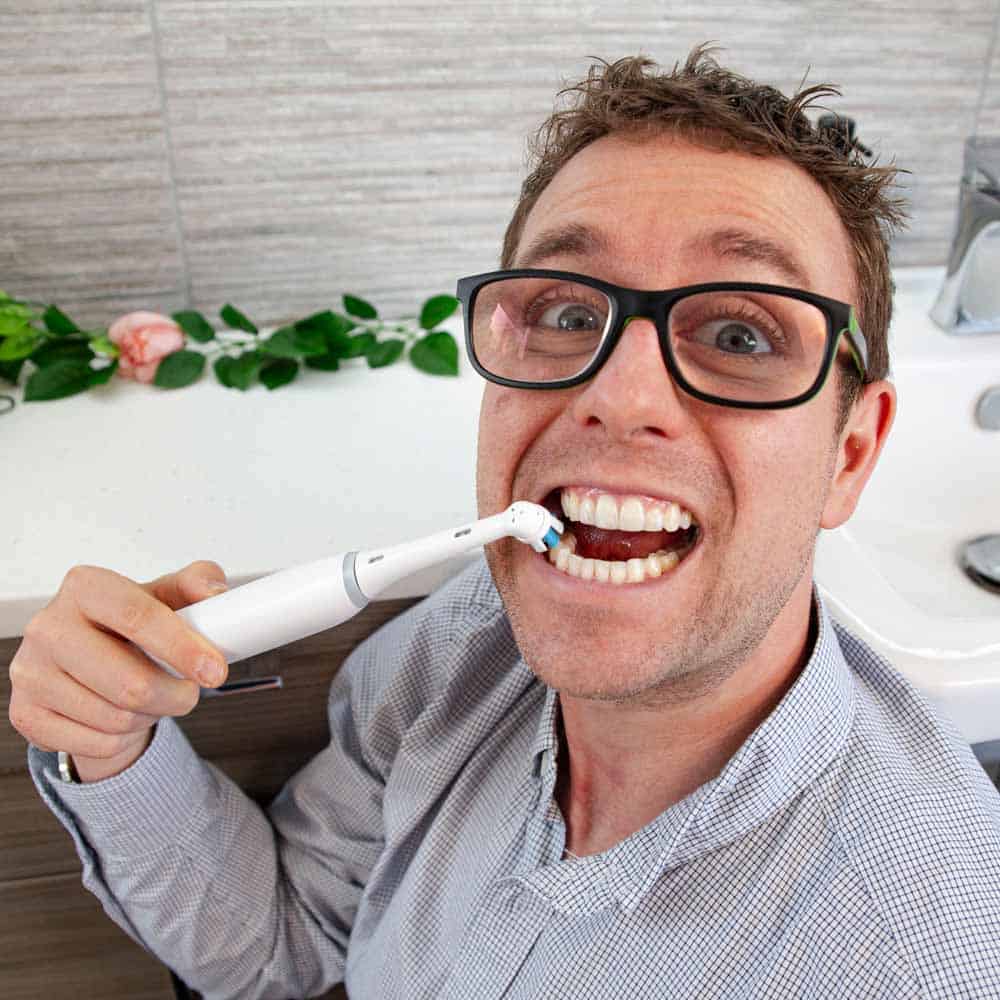
Most environmentally considerate
SURI
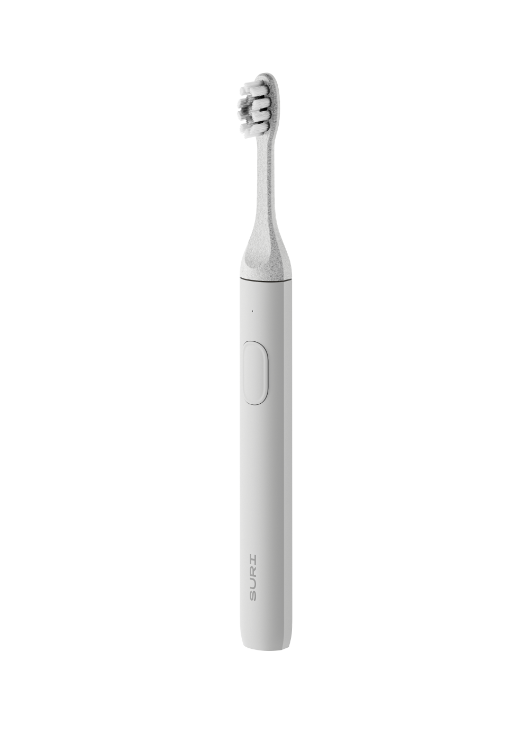
Cleaning modes: 2 | Battery life: 40 days | Bluetooth: No | Noise: 54dB | Head cost: $9 | Cost to own - 3 yrs: $255
Who it's for:
Someone who’s willing to pay a bit more for a good quality brush that considers the planet
Why we like it:
Our team has been thoroughly impressed by the quality, travel-friendly design, cleaning results and company ethos of SURI — several have made it their daily toothbrush since its original testing in 2022.
More on why we chose it...
Unlike most other brushes SURI’s handle is made of metal, which gives it a premium look and feel. We find its weight and shape balance nicely in our hands and give it a solid, well-built quality.
It’s a brush that’s easy to keep clean and doesn’t need charging regularly. We’ve found the cleaning results to be just as good as brushes from major brands.
SURI has made simple design choices that work. The compact travel case feels sturdy and allows the brush to charge in the case. We’ve also enjoyed reduced clutter in the bathroom thanks to the effortlessly simple magnetic wall mount.
The main downside is that SURI doesn’t come with a pressure sensor. As experienced toothbrush users, this wasn’t a problem for us. But if you’re a first time toothbrush user or if you know you brush too hard, this may not be the brush for you.
The brush heads can also be a bit stiff to pull off, which you need to do every so often to rinse the brush thoroughly. This is only likely to be a problem if you’ve got dexterity issues or have trouble gripping things tightly.
For many, the main appeal of SURI will be its better focus on environmental impact than its competitors. It’s designed to be easily repaired, albeit by SURI rather than the user. This is commendable and something we look at more closely in our SURI video review.
What we like |
Worth noting |
|---|---|

Environmentally considerate materials and design |
No pressure sensor to alert you when brushing too hard |

Slim handle |
1 year warranty if not subscribed |

The timer and pacer encourage brushing for the recommended time |
USB charger makes it less convenient for some |
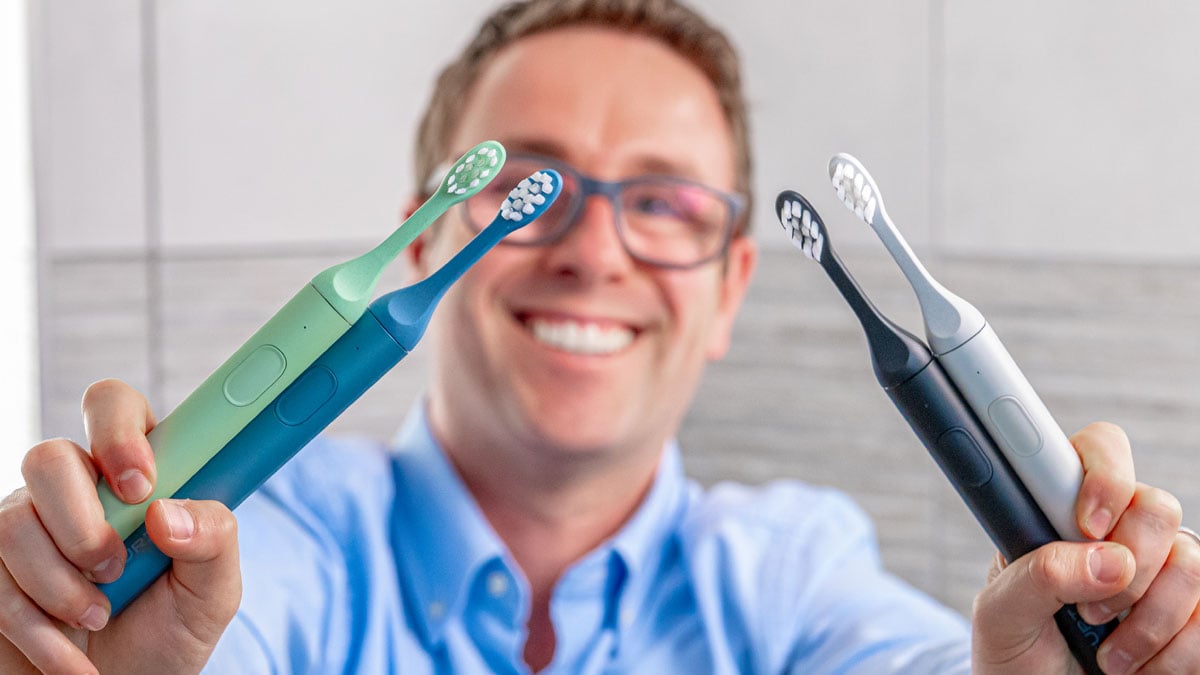
Best top of the range
Sonicare 9900 Prestige

Cleaning modes: 5 | Battery life: 14 days | Bluetooth: Yes | Noise: 71dB | Head cost: $12 | Cost to own - 3 yrs: $612
Who it's for:
Someone who wants the very best and doesn’t mind paying for it.
A fantastic brush, but more than you need:
We love how it looks, how it feels and how it performs. It has certain refinements and extras that you don’t get with more affordable models. It’s the best smart toothbrush we’ve used.
More on why we chose it...
The smooth touch materials are good quality and we found it easy to keep clean.
To address past reliability issues, Philips has implemented a seamless power button design. The intention of this is to reduce grime build-up and, from our testing, this seems to have worked. It does mean that the feedback isn’t as tactile — it’s a bit firm — but this wasn’t a big issue for us overall.
To some, it might feel a bit overbearing, but the Sonicare app and tracking technology can improve your oral care routine. It shows where you have and haven’t brushed, which helps if you like to learn visually. It tells you if you’re brushing too hard and it even monitors, alerts, and adapts if you move the brush head too much.
During our testing, we didn’t find the smart features to be annoying, but we stopped checking the app for feedback after a while, which defeats the point of having a premium smart brush. Unless you’re dedicated enough to spend the time using it, it’s not worth paying for the extra tech.
Something we did find frustrating was having to use the app to change the cleaning mode. Unlike other toothbrushes, you can’t do it using the handle itself. Then again, the extra modes have little benefit in our experience.
The compact USB-C enabled charging case feels robust and we’ve enjoyed its smaller-than-average profile when traveling. The strap on the case is a little impractical — it’s too tight to go over most hands and onto the wrist — but it’s a minor complaint in the scheme of things.
Read our Sonicare Prestige 9900 Review.
What we like |
Worth noting |
|---|---|

Premium look & feel |
Expensive |

Visible pressure sensor alerts you when brushing too hard |
No place to store the detachable USB cable |

Reminds you when to replace your brush head |
Pressure sensitive buttons |

Stylish & compact charging travel case |
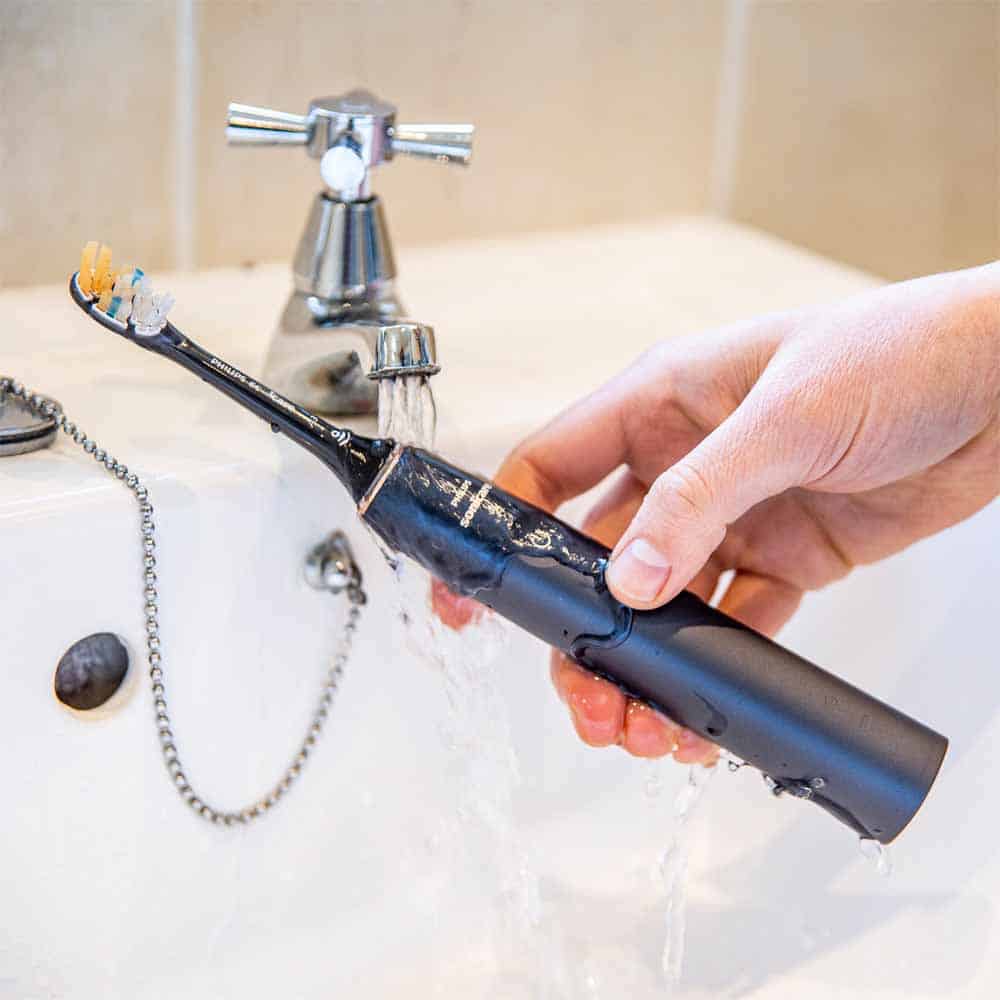
Best budget
Oral-B Pro 100

Cleaning modes: 1 | Battery life: 8 days | Bluetooth: No | Noise: 75dB | Head cost: $7 | Cost to own - 3 yrs: $115
Who it's for:
Someone who wants a reliable brush for as little money as possible.
Cheap, but still reliable:
We love that for a fair price you get a really grippy handle that delivers perfectly adequate cleaning results. Impressively, the Pro 100 doesn’t look or feel cheap — the reduced cost comes from excluding some features.
More on why we chose it...
The Pro 100 would suit a lot of different users, but from our testing, those with arthritis or dexterity issues come to mind in particular. The large rubber grip wraps around the whole handle and doesn't feel slippery, even when wet. The tapered design is a bit thicker than most brush handles, which helps if you can’t form a tight grip.
A slight negative is that toothpaste residue and grime can collect on the dimpled surface, but it’s a worthwhile tradeoff. The 100 does not include a pressure sensor, but that is understandable at this price point.
Another downside is that there is nothing to indicate battery status. The Pro 100 has one of the shortest usage times of a rechargeable toothbrush, so it would be useful to get a warning when it needs a top-up. Unless you charge it after most brushing sessions, there is a good chance of it powering off mid brushing. Depending on the convenience of your charging setup, this is a worthwhile trade off for the cost saving.
Read our Oral-B Pro 100 Review.
What we like |
Worth noting |
|---|---|

Simple to use – 1 cleaning mode |
No 30 second pacer |

The grip on the handle helps to securely hold the brush |
No pressure sensor |

The small round brush head reaches tighter spaces |
No battery status feedback |
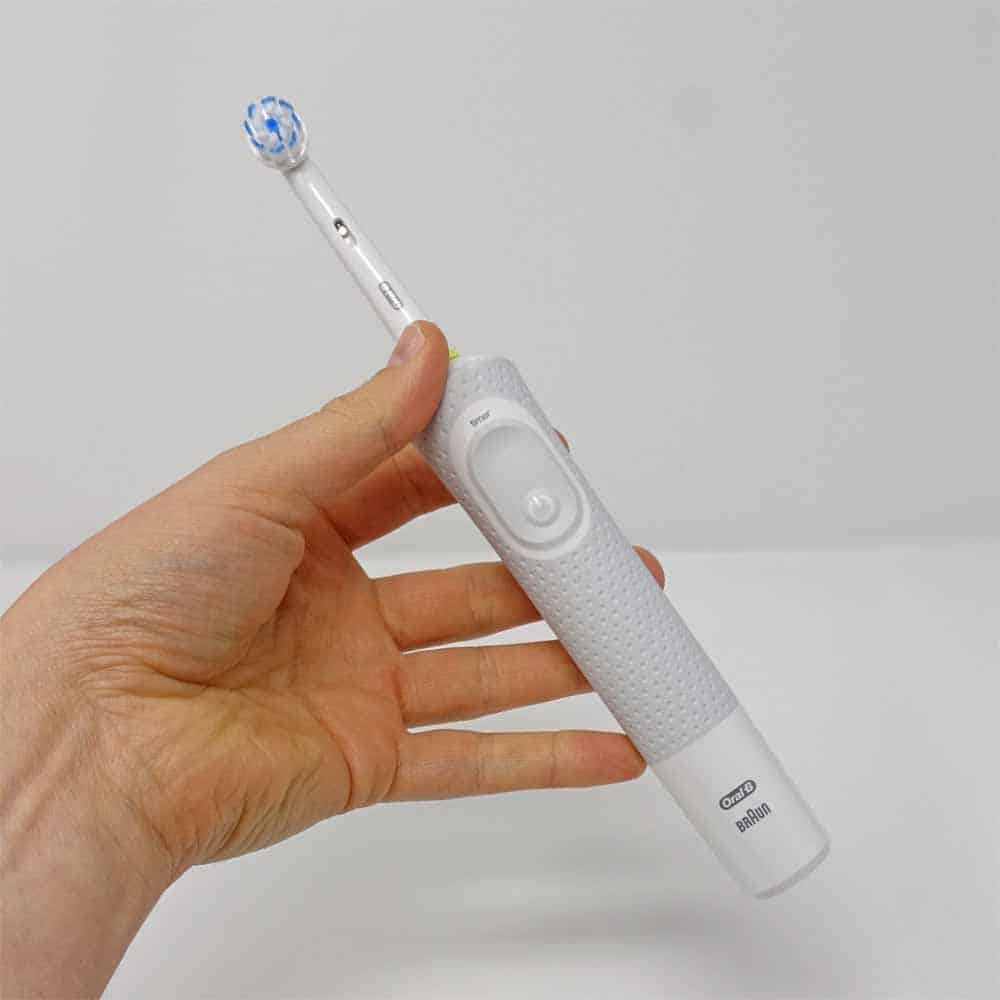
Best for sensitivity
Sonicare ProtectiveClean 4300

Cleaning modes: 1 | Battery life: 14 days | Bluetooth: No | Noise: TBC | Head cost: $12 | Cost to own - 3 yrs: $222
Who it's for:
Those who want a gentle but effective clean. See the advice in this section if you've got sensitive teeth or gum recession.
Why it's good for sensitive teeth and gums:
We liked the less intense brushing sensation and long battery life.
The Sonicare 4300 ProtectiveClean is the Philips equivalent of the Oral-B Pro 3000. It’s quieter with good cleaning results at an affordable price.
More on why we chose it...
The 4300 offers a low and high power setting. Both intensities feel less harsh on the teeth and gums than the oscillating-rotating action of Oral-B models. The vibration of the handle felt a bit more ticklish at times, but we soon got used to it.
A Clinical study has found evidence that Sonicare’s sonic cleaning action can deliver better results long term than an Oral-B brush, particularly for more advanced gum disease.
If your sensitivity was caused by brushing too hard, the pressure sensor in the ProtectiveClean will alert you if you fall back into old habits. Configured differently from Oral-B, the handle vibrates rather than activating a light. It’s more noticeable and more useful if you are blind or partially sighted.
The automatic reminders the 4300 gives to replace the brush head are useful. It’s all too easy to forget when you last swapped the bristles. The notification isn’t too annoying and you’re not prevented from using the head for longer if you want to.
When you do replace it, the 4300 detects the new head automatically. There’s no need to reset the tracking facility like there is with app-based brush head trackers on some other brushes. It’s an effortless process. The only thing we don’t like is that more e-waste is created each time you use a head.
Battery life is noticeably better than Oral-B models. We found we were getting up to 5 weeks of use on a single charge, despite only 2 weeks of claimed usage time from Sonicare.
Read our Sonicare ProtectiveClean 4300 Review.
What we like |
Worth noting |
|---|---|

1 cleaning mode with 2 intensities that’s easy to use |
No icons to show which intensity is selected |

Long battery life |
|

Reminds you when to replace the brush head |
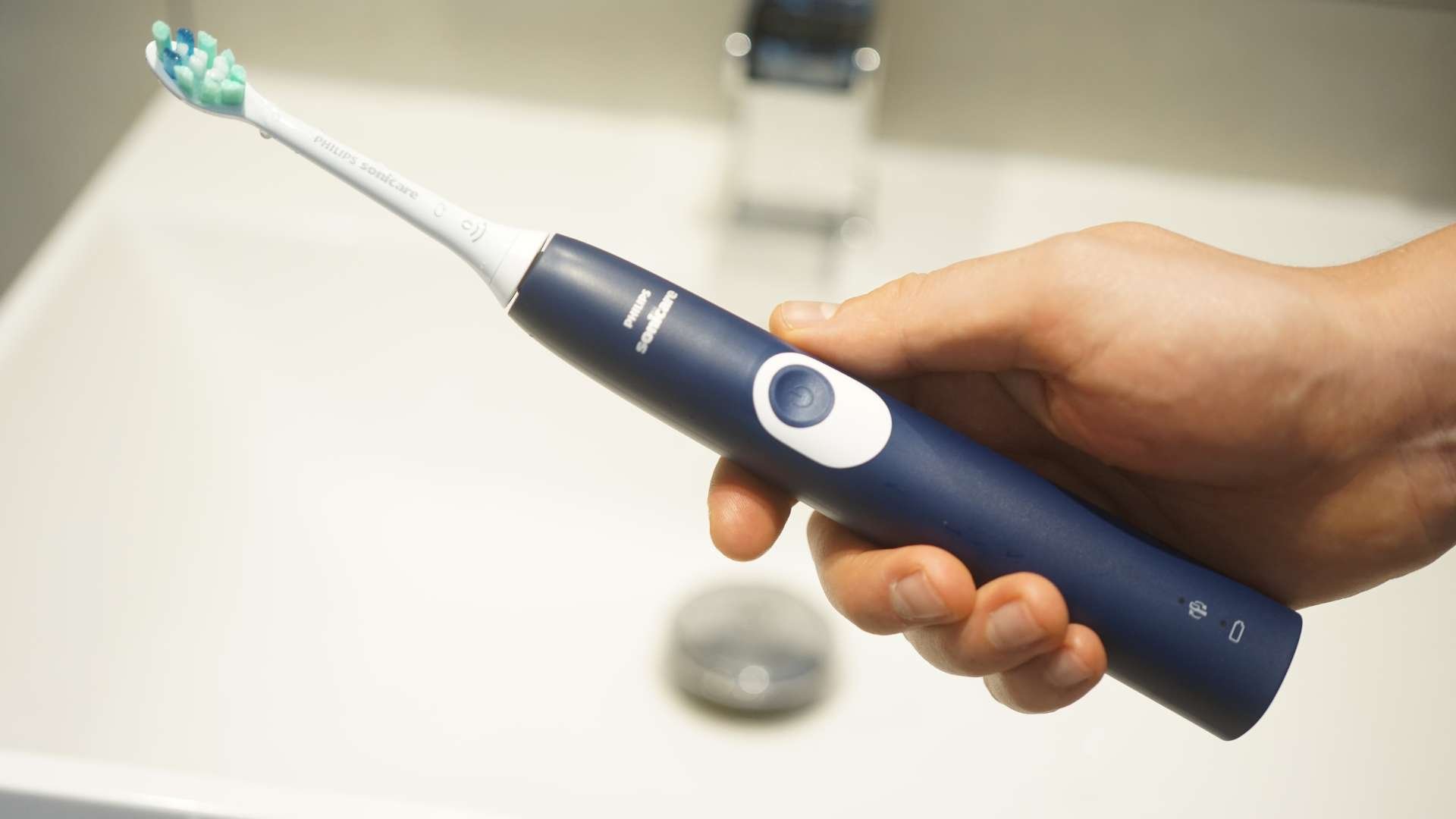
Notable mentions
These are products that didn't quite make it into our list above, but have features that some users may find useful in specific cases.
Curaprox Hydrosonic Pro
The small teardrop brush heads with soft bristles are an absolute delight to use. We found it much easier to reach the tighter spaces in the mouth with these heads compared to most other sonic brushes. The silicone backed heads helped to prevent that cold and harsher feel on the teeth and gums.
The handle is unique in that it has flat sides and we noticed how it encouraged us to tilt the brush at the correct angle.
It looks and feels great, but is a bit pricey given the other choices available. It's available from Curaprox or Amazon Australia.
Recently tested
The iO Series 10 is the latest addition to the iO range of electric toothbrushes. It’s unique features is the visual feedback the new charging stand offers compared to the iO7, 8 and 9. You don’t need to use the smartphone app so regularly. It’s very clever but eye-wateringly expensive. We don’t recommend anyone buy it. Other models such as the iO9 are much better value.
We don’t just test the major brands, we like to ensure we get hands on with a wide variety of models from new companies. The R2 and D2 from Bitvae are more affordable options that are closely matched for features to the Pro 3000 and Sonicare 3100. The savings are not huge, but reasonable. The main reason being the money saved because you get more heads in the box. Replacements are also priced better. Although it doesn’t impact daily use, material quality is one compromise — we could feel the difference. Subsequently, long term reliability is a concern. As a newer brand, Bitvae is yet to prove itself.
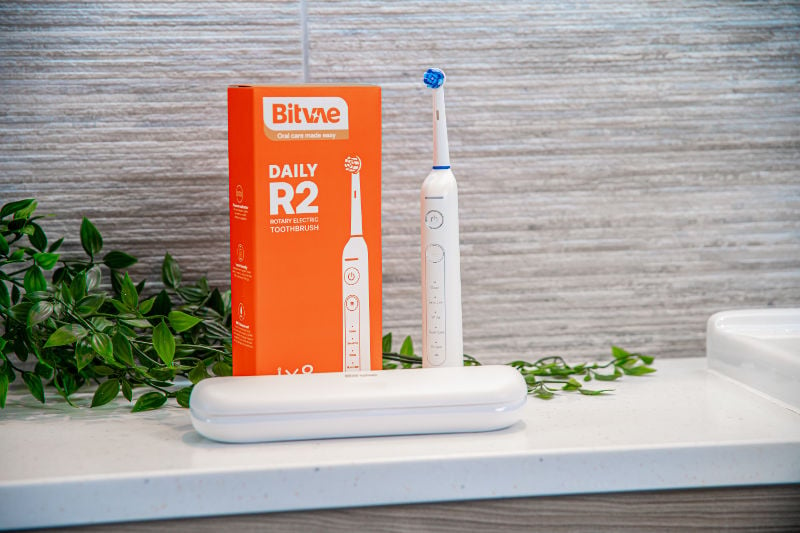
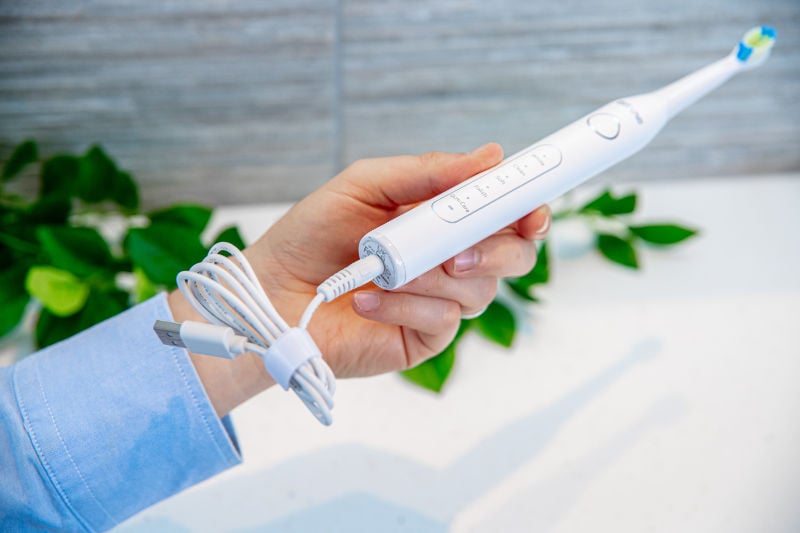
Buyer's guide: useful tips from years of toothbrush testing
In the following sections we've included things we've picked up from reviewing the full spectrum of electric toothbrushes over the last decade.
We cover the features we think are the most important to pay for, as well as others that are worth considering but not critical for the majority of users. We also give some advice on how much to spend.
A pressure sensor, a timer and a pacer are the features worth paying for
These three features help to make sure you brush correctly and for the right amount of time. Generally, you can get a good brush with these features for around $60-100. They are particularly useful if you're a first time toothbrush user, or if you know you brush your teeth too hard.
We have a post that looks at electric toothbrushes with pressure sensors in more detail, but below we have included an overview of why they're important, and here are our main recommendations at a glance:
How pressure sensors vary (and why they’re important)
Brushing too hard can damage your teeth and gums. A pressure sensor helps prevent this. Consequently, it's a key feature recommended by our in-house dentists.
If you know that you brush too hard, or if you’ve never used a toothbrush with a pressure sensor, it’s a feature worth strong consideration.
Keep reading
Sensors are implemented differently. In many instances when pressure is detected, the motor will slow down until the pressure is relieved. This limits the bristle movement and potential damage.
A visible pressure sensor will illuminate to act as a visual alert. This is common in Oral-B brushes. Normally, a red light illuminates around the neck of the toothbrush.
Some models, notably Sonicare, will vibrate the brush handle to alert you.
If you tend to brush your teeth in front of a mirror, you will likely find the visible pressure sensor (one that lights up when you apply too much pressure) easier to take note of.
However, if you tend to get a bit distracted as you brush, don’t brush in front of a mirror or are visually impaired, the beeping or vibration patterns generated by some pressure sensors (notably Sonicare) are better.
With the exception of the Sonicare DiamondClean 9900 Prestige, most brushes do one or the other, not both.
The Oral-B iO range features a more advanced pressure sensor. It indicates when you’re brushing too hard, but also when you are applying the correct or insufficient amount of pressure. We did find this to be reassuring, but it’s something you could skip if you’re on a tight budget. The main thing is that you don’t brush too hard.
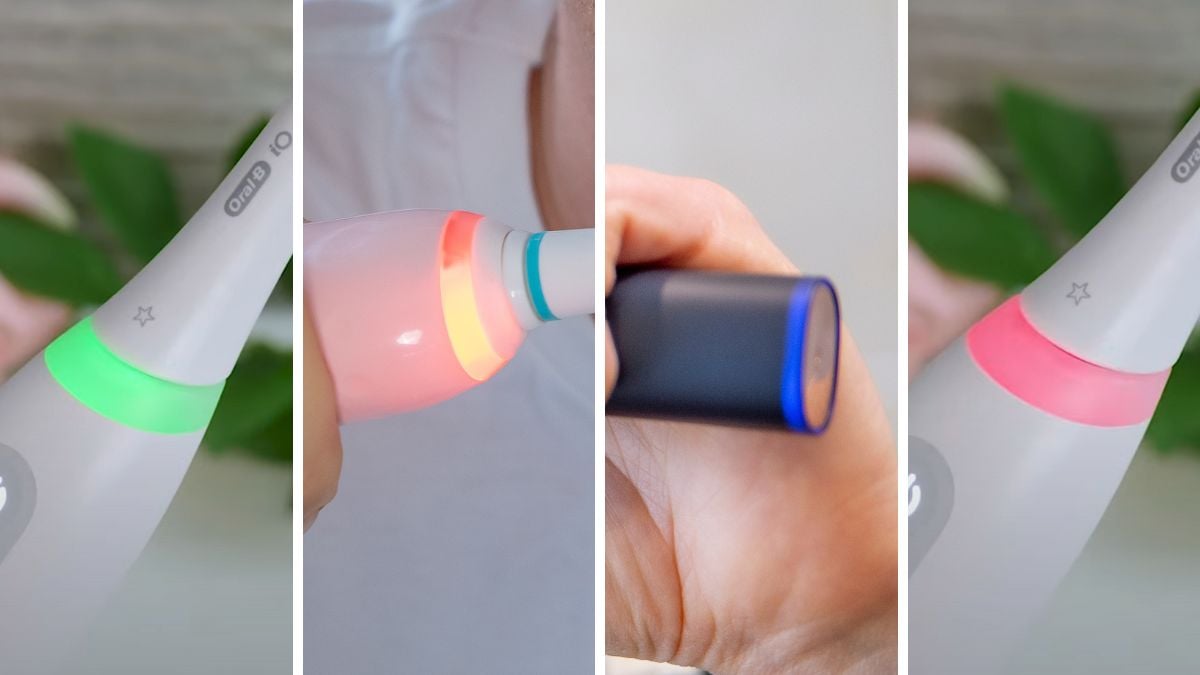
Most brushes have a timer and a pacer
For 2 minutes twice a day is how long you should spend brushing your teeth according to the likes of the Australian Dental Association and the World Dental Federation. It’s the optimum time for effective plaque removal.
A timer lets you know when you’ve brushed for this long, whilst a pacer encourages even brushing of the teeth.
All of the brushes we've recommended above have a timer and pacer included. The only exceptions are the Pro Battery which has no timer or pacer, and the Vitality which has a timer but no pacer.
These are features that are really useful and we've found that the way they work tends not to vary much from one product to another. Don’t worry too much about these when choosing a brush. The main thing is to make sure your brush does include them, if your budget can stretch that far. There can be some nuance to them, which we explain in the toggle sections below.
Find out more about timers
The vast majority of brushes automatically turn off after 2 minutes. This might be annoying if you're someone who likes to brush for longer than that.
Oral-B brushes don’t tend to turn off, that’s for you to do when you’re ready to finish brushing. It will pause briefly 3 times at 2 minutes to alert you that the recommended time has been achieved.
Find out more about pacers
Most pacers work by pausing the brush motor at 30 second intervals. The pause in the sound and motion of the toothbrush is your cue to move from one quadrant of the mouth to another. Some brushes (notably Sonicare) have a pacer set to 20 second intervals. This results in 6 sections of the mouth for you to brush.
We've tested hundreds of different brushes over the years and we've never found the implementation of the pacer to make that much difference to how well we brush.
The bottom line is that a pacer is useful to have, especially as you develop your own rhythm to brushing with an electric toothbrush, but precisely how the pacer is implemented doesn't matter too much.
We’ve heard from some users how they dislike a pacer and prefer to brush at their own pace. Unfortunately, few brushes allow the pacer to be disabled. Some brushes, normally the ‘smart’ ones such as the Oral-B iO and Genius models, offer some customisation around timings.
Some brushes are easier than others to keep clean
It’s important to keep your brush clean. The last thing you want is to be putting unwanted bacteria into your mouth.
We’ve found that a quick rinse after each brushing session and then leaving the brush to air dry is typically the best approach. UV lights and sterilising processes can help but are not essential or as recommended as you might think.
During our long-term testing of brushes, we have found that grime can build up more easily on some than on others — we've included some examples in the next section. If you’re often in a rush when you brush your teeth, it’s a good idea to have a brush that’s simple to clean.
From those we’ve recommended above, the easiest to keep clean are: Oral-B Pro 3000, SURI, Sonicare 4300 ProtectiveClean and 9900 Prestige.
Some brushes collect grime easily
We’ve found the Oral-B iO series to be one of the worst offenders for grime build up. That’s not to say it can’t be kept grime free — it can — but it takes more effort than other brushes that just need a quick rinse under the tap.
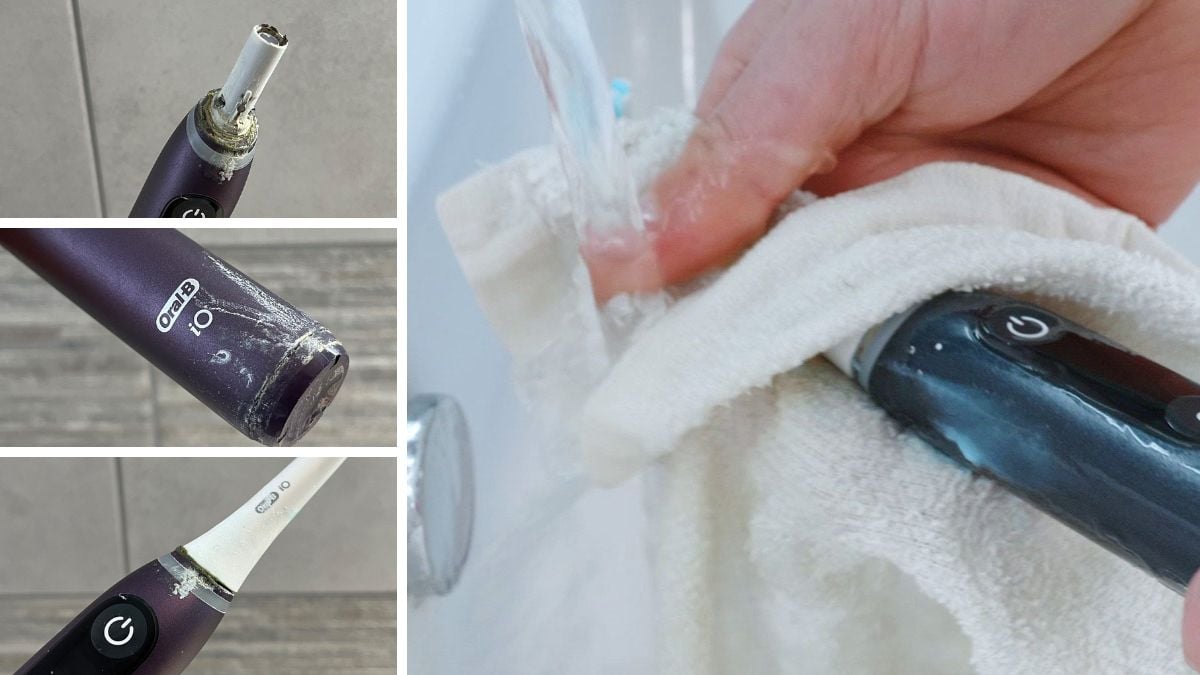
The design of the iO motor and heads makes it easier for muck and mould to build up within the neck where the brush head attaches. Even with thorough rinsing after each clean, we still find that grime tends to build up after a few weeks. We’ve found the most practical way to remove it is with a used interdental brush.
Brushes with large textured rubber grips do tend to be worse for dirt build-up than the smooth, all plastic handles of some brushes — examples here are the Vitality, Genius and Smart models from Oral-B. Residual toothpaste and gunk dries to leave white streaks. Cleaning from the textured surface can be much harder, particularly if you don’t keep on top of it. We advise prioritising grip and comfort over ease of cleaning, though.
Battery life isn’t that important
Unless you are away from mains power frequently, don’t worry about battery life. The majority of rechargeable brushes last 3-4 weeks or longer on a full charge.
We’ve found Oral-B’s battery life to be the worst of the major brands. Expect 2 weeks on average, including from premium models. We’ve seen first hand how iO models with displays can suffer from excessive battery drain and give just 10-12 days use on average.
An overnight charge is sufficient for most brushes, but some can take as much as 24 hours if completely flat.
For most people noise isn’t an important factor, but some brushes are significantly quieter
For each brush we review, we use a decibel metre to take a reading of its noise level. So far we’ve found the range sits from 48 db to over 80 db, which is quite a variation.
Noise may be an important consideration if you’ve got young children that you don’t want to disturb, or light sleepers in the house who won’t appreciate the sound of a noisy motor.
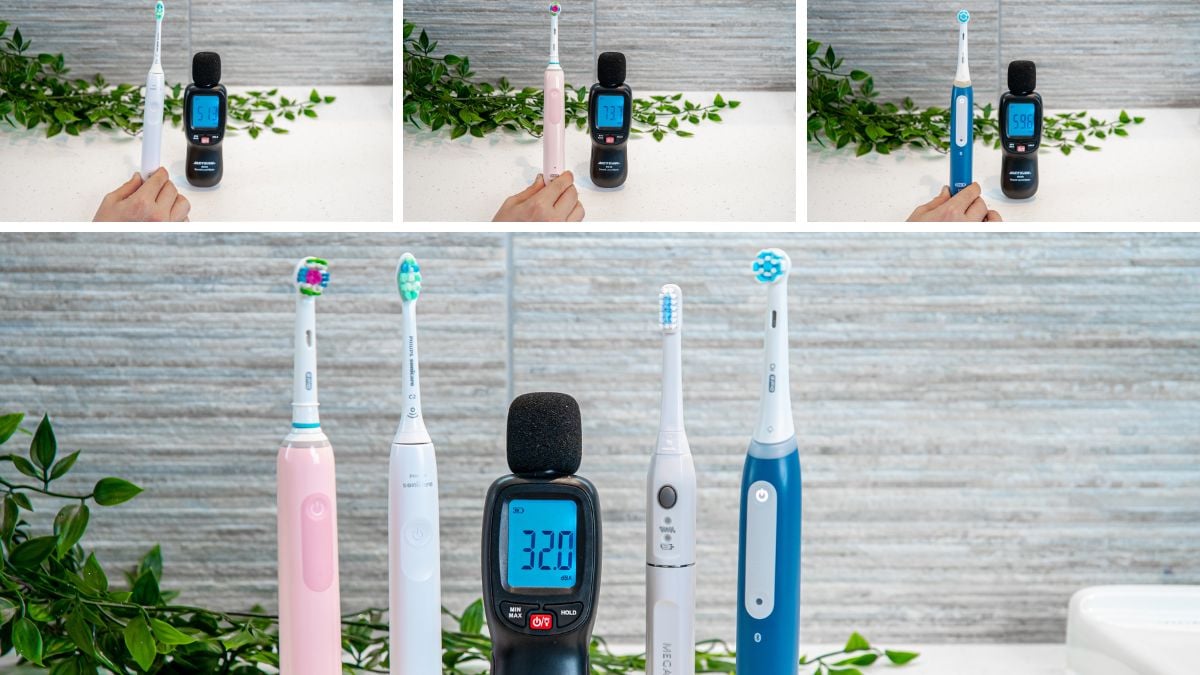
That being said, noise isn’t the biggest consideration for an electric toothbrush. Even with the noisiest brushes, we’ve found that a closed bathroom door drowns out most of the sound. But if you have thin walls or do have a need to be very quiet, it’s a worthwhile consideration.
The quietest toothbrush we've tested so far is the Oclean X Pro Elite. From our list above, SURI is also particularly quiet.
You can get a good brush for less than $80 — spending more doesn't mean cleaner or whiter teeth
We’ve tested brushes that cost as little as $20 and as much as $800. Truthfully, you don’t need to spend more than $80-100 to get a reliable brush with the most important features. Our main recommendation, the Pro 3000, is a good example of this.
The key features our in-house dentists recommend are a pressure sensor, a timer, and a pacer. Generally, you can get these from around $80. Many of the brushes we’ve tested in this price range are more than adequate.
Spending more money on a toothbrush may provide things like travel cases and better battery life, but these aren’t going to actually help brush your teeth better.
Don’t go too cheap, though
Based on the above advice you may be tempted to spend as little as possible. We would caution against this because we have noticed there are reliability issues with cheap brands.
And whilst you can get by without a pressure sensor, timer and pacer, ideally your brush should include them because they help you to brush properly and for the right amount of time.
If you want a quick reliable recommendation that gets the job done, check out the Oral-B Pro 100.
We don’t recommend smart toothbrushes for the average user
We’ve been testing smart (Bluetooth enabled) toothbrushes since they first launched around 2016.
Whilst we’ve found that the technology in the latest models like the Oral-B iO Series 10 and the Sonicare Prestige 9900 does work very well, it is overkill for the average user.
We generally don’t recommend them. You don’t need the tech to be able to clean your teeth well — plaque disclosing tablets work just as well — and to get the most from them you often need to have your phone with you when you brush.
A survey of our YouTube audience found that 57% had a smart toothbrush, yet 69% don’t use the features after 3 months.

Apart from the ‘smart’ technology, these brushes often come with additional cleaning modes and a travel case.
In our experience, there is little difference between most cleaning modes. Having a sensitive mode is useful, but this is included with far cheaper brushes.
A travel case can also be a good addition, but again, you don’t need to spend $500 to get one. We rate SURI as having the best travel case and that is far cheaper than a smart toothbrush.
Unless you are willing to spend the time and effort using the brush tracking technology that a smart brush offers, save yourself some money and go for a cheaper model.
Brush head styles aren’t that important, but do affect cost
Brush head ranges are unnecessarily complicated. There is no definitive evidence to say one head is better than another. Studies will claim to have found important differences between them, but this is always in comparison to a manual brush. We’re yet to see 2 Oral-B heads compared to one another in a clinical study.
We’ve tested the full range of brush heads from Oral-B, Sonicare and Colgate and found little to separate them. We’ve also tested generic heads, which are cheaper but still of an acceptable standard.
Sonicare’s premium heads have a silicone backing to them, which feels noticeably softer on the cheeks and reduces that harsh irritating sound if they come into contact with the teeth. But, we find it difficult to justify the price increase when normal heads work just fine.
The main thing you do want to watch out for if you’re buying generic heads is that you don’t get cheap counterfeits as they won’t do as good a job.
Sonic brush heads tend to be larger than the small circular brush heads found on Oral-B’s oscillating-rotating toothbrushes. Sonic heads have an oval shape to them.
We have found that Oral-B’s heads can sometimes make it easier to reach right behind the back molars and other tight spaces because their necks have a shorter length. This isn’t a factor worth giving too much importance to unless you have a particularly small mouth.
As a side note, if you are finding it difficult to reach certain parts of the mouth, it’s better to brush with your mouth almost closed. Having your mouth open extends your jaw and can make it harder to reach certain areas.
The brush you choose will affect how much you spend on brush heads
Pay attention to this because it could save you $200 over the lifetime of your brush.
If you’re buying official heads for a well-known brand, Oral-B heads for non-iO brushes (Vitality, Pro, Genius Series models) tend to be the cheapest.
Oral-B iO brush heads are almost twice the price of other Oral-B heads. The cleaning results are not twice as good. As it stands there aren’t many generic options available as an alternative for iO models. Those that do exist cost considerably less. You can get as many as 6 generic heads for the price of 1 iO Series manufacturer original. Sonicare brush heads tend to be more expensive than Oral-B, but there are good generic options available to bring the price down.
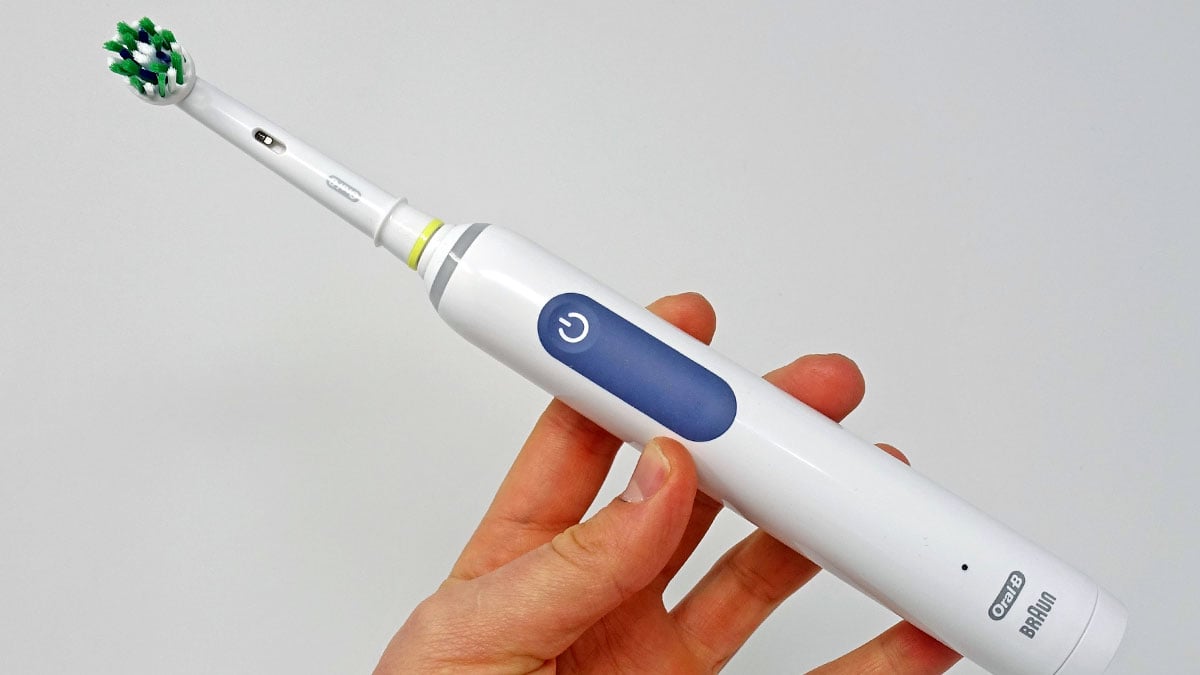
Try to buy heads where the bristle tips are rounded or smoothed off, like the manufacturer’s own. We found that cheaper generic heads often have ‘rough cut’ bristles. They still clean well but can be a bit more abrasive on the teeth and gums.
You can save money if you buy an electric toothbrush and heads from a lesser-known brand, but the caveat to this is reliability issues.
A word of caution though: sometimes there is such a thing as too cheap. We’ve read and heard stories of brush heads cracking, falling apart and bristles falling out as people use them.
Soft brush heads and sensitive cleaning mode are good if you have sensitive teeth or receding gums
Generally speaking, we haven’t found that cleaning modes and brush head styles make much difference to brushing experience. A standard cleaning mode and brush head do the job just fine. The exceptions, though, are soft brush heads and sensitive cleaning modes.
We have at times found it useful to switch to a soft head or cleaning mode during times of tooth or gum sensitivity. If you have sensitive teeth or gums, or some form of gum disease, these are particularly useful features.
Even if you don’t have sensitive teeth and gums, a sensitive cleaning mode or soft brush head can help to ease you into a new brush. This was the case for one of our team when we started testing the Oral-B iO range. The cleaning action of the brush felt more intense than previous Oral-B models, so we used the sensitive mode for the first week or so to get used to it.
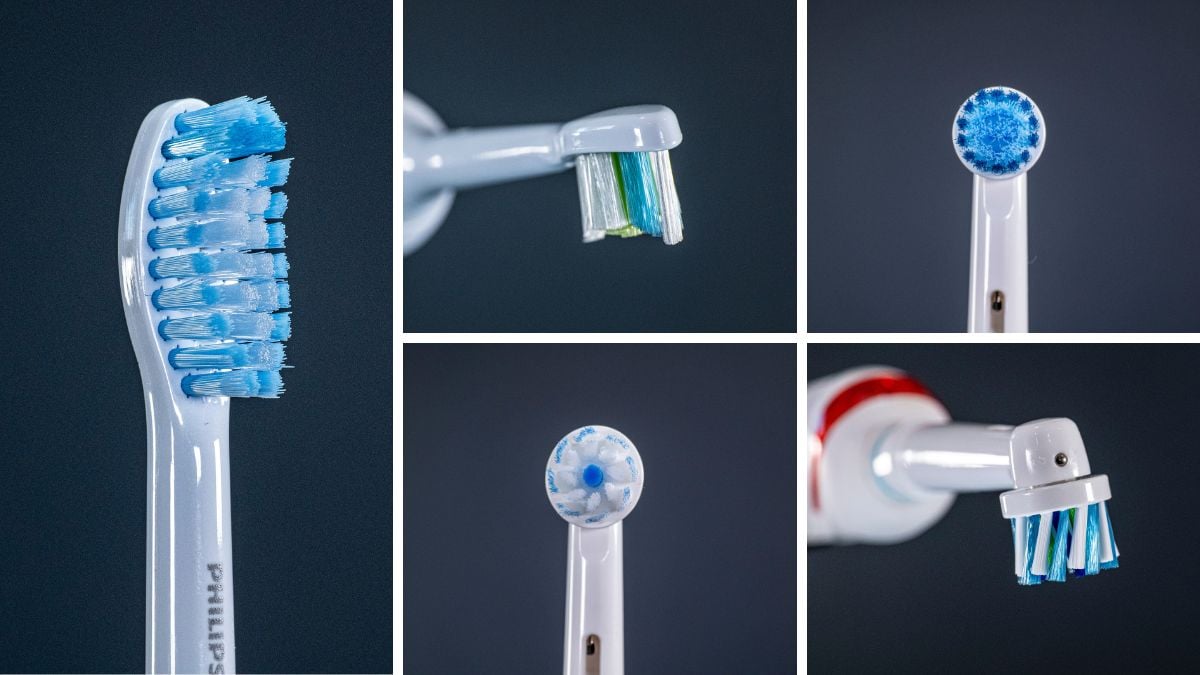
Oral-B and Sonicare both make soft brush heads for their full range of brushes, so this is something that you can add on afterwards if needed. Many brushes do come with a sensitive mode, but you’ll want to double check your prospective brush has it if it’s a feature you think you’ll benefit from. We’ve found the feeling of gentle cleaning modes doesn’t vary much from one manufacturer to another, so you don’t need to scrutinise this too much.
There is some variation in the way that gentle / sensitive modes are named. Some manufacturers instead refer to them as ‘intensity’ settings. A high and a low intensity settings are usually comparable to standard clean and sensitive mode.
Oral-B
For receding gums or sensitive teeth, I recommend you try the Gum Care head for an Oral-B brush.

We have a post on the best Oral-B brush heads that explains the range in detail.
Sonicare (BrushSync)
For Sonicare BrushSync brushes try the G2 Optimal Gum Care head. It is BrushSync heads that have Sonicare's reminder technology built in. They are more expensive than the non-BrushSync heads.

Sonicare (non-BrushSync)
For non-BrushSync brushes try the S Sensitive head. It's worth noting that these are also compatible with BrushSync heads.

We have a guide on the best Sonicare brush heads that goes into more detail about the various op
Some brushes are now charged via USB
The set up of your bathroom and the brush you choose will dictate how convenient it is to charge it.
Most toothbrushes are charged via a 2-pin charger.
Some newer brushes are charged via USB only, which rules out the opportunity to charge them in your bathroom, unless you have a 2 pin USB adapter. This may or may not be an inconvenience for you.
The Sonicare 2100 and 3100 are examples of this. They do fit and charge on the older style Sonicare charging stands too, so if you prefer your existing Sonicare charging stand, you can still make use of it.
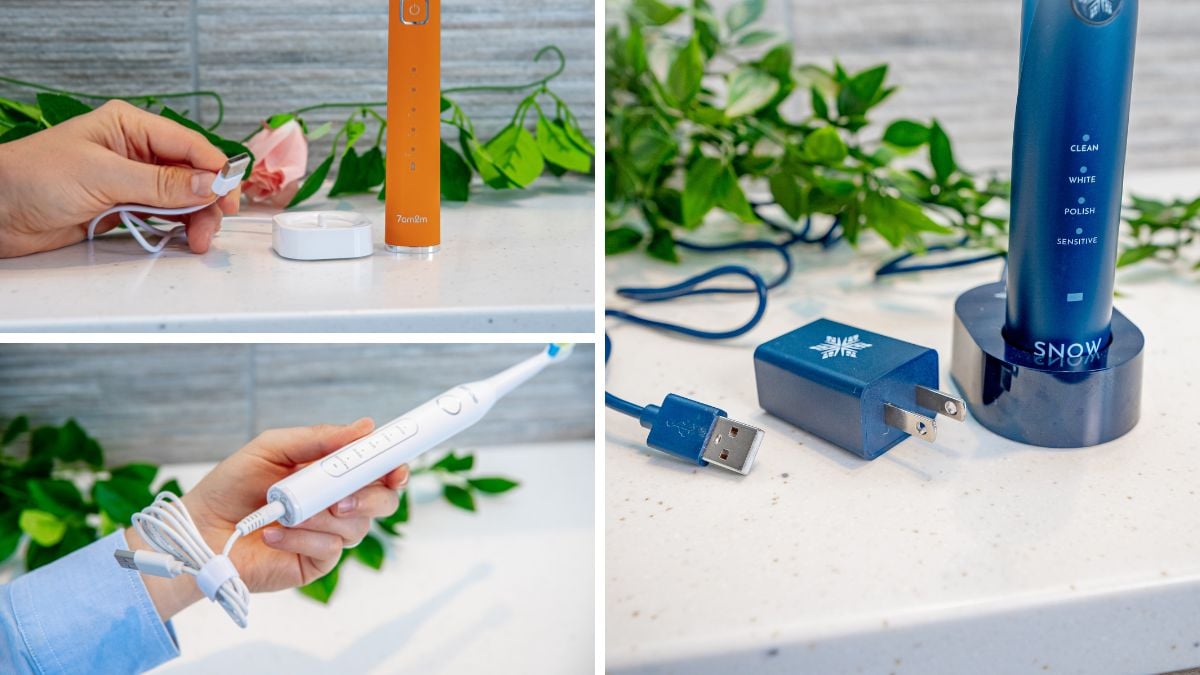
Some brushes can be charged in the travel case they are supplied with, which can add another option and more flexibility. SURI, as an example, is charged via USB Type-C. It can be charged within its case, using the same cable that charges many Android phones and the latest iPhone 15. We’ve found this to be a convenient way to charge the brush, especially as it only needs charging every few weeks.
A travel case is a useful accessory
In our experience the most useful extras to be supplied with a toothbrush are additional heads and a travel case.
Brush head stands and storage compartments can be convenient if you share a toothbrush with others, but are far from essential.
You don’t need to be a regular traveller to benefit from a case. Even if you occasionally go away for a night or two, a case protects the bristles from damage and dirt. Not to mention preventing other things in your wash bag from getting wet. It can also prevent that awkward buzzing sound in your luggage as you pass through customs!
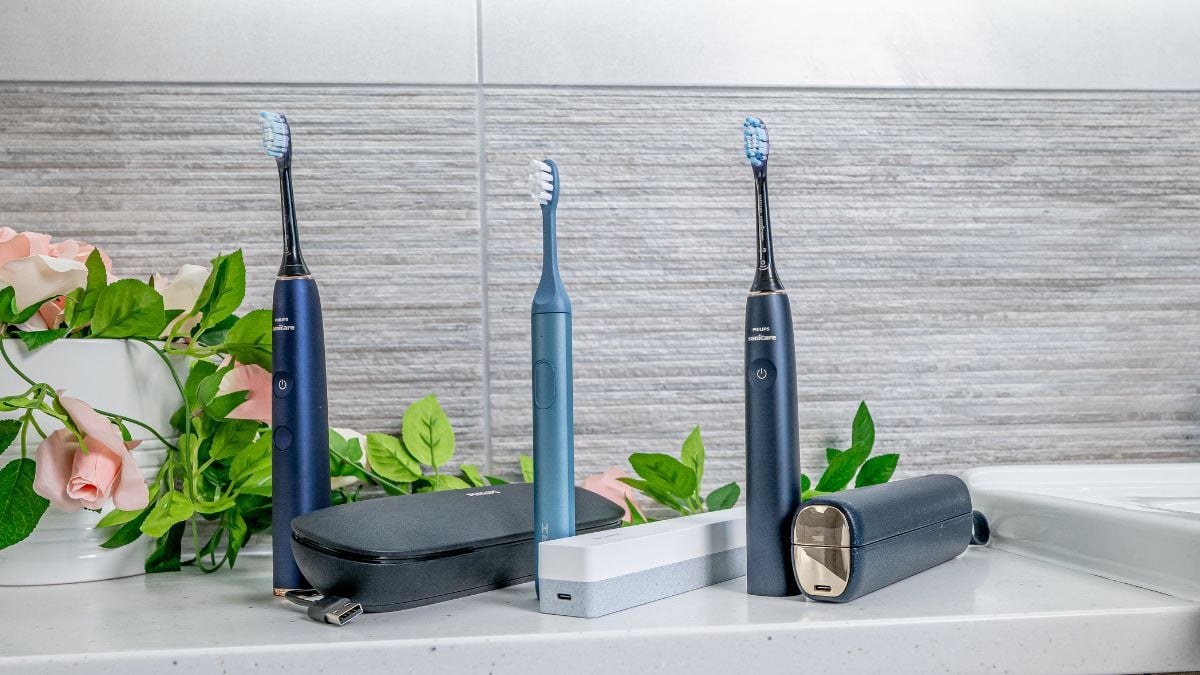
It’s well worth spending an extra $10 if you can afford it to get a case included. It’s harder to buy official cases afterwards. Third party cases serve a purpose but tend not to be as good.
Jon found a travel case useful during his recent Invisalign treatment. He was having to brush more regularly, often away from home, and having a case made things more convenient.
For those always on the go, charging travel cases are great. SURI’s is particularly slim and uses the same charger as most phones. Oral-B’s charging case is less convenient as it requires a bulky proprietary power adapter.
Things to consider if you’ve got dexterity issues
The majority of toothbrushes have a clean and minimal look with minimal textured surfaces for gripping onto.
Oral-B’s Smart 4 and Genius models use different materials and textures to aid with grip. Although slimmer, the Philips One has a really textured handle, which makes it easy to grip. The Hydrosonic Pro from Curaprox is all smooth plastic, but the squarer design really helps with grip.
Aftermarket add-ons do exist but none are particularly pretty and do look like an add-on.
The vast majority of brush heads are pushed onto a brush handle to attach and pulled off to remove. Few require twisting or locking into place. You don’t typically need lots of force to attach or remove them.
We’ve found that SURI brush heads are some of the tightest fitting and can at times require an extra firm grasp to pull them off. This might be tricky if you struggle to grip or have limited strength in your joints.
Power buttons are something to consider too. Colgate’s Smart Hum and Hum Rhythm are 2 examples that we've found to have firmer buttons than other brushes and make for a less enjoyable user experience.
Many brands have money back guarantees, so you can buy online, try and return if they don’t work for you.
More detail: our electric toothbrush reviews
In order to gather the advice and recommendations above, we've extensively tested and compared a wide range of electric toothbrushes. For the vast majority of brushes we test, we either complete a written review, a video review, or both.
In the sections below we've grouped our written reviews. You can see our video reviews and comparisons on our YouTube channel.
Oral-B
- Oral-B Pro 2 2000 review
- Oral-B iO9 review
- Oral-B Pro 800 review
- Oral-B Pro 1500 review
- Oral-B Smart 7 7000 review
- Oral-B Smart 5 5000 review
- Oral-B Genius AI review
- Oral-B Genius 8000 review
- Oral-B Genius 9000 review
- Oral-B Vitality review
- Oral-B Pro 500 review
- Oral-B Pro 3000 review
- Oral-B Pro 700 review
- Oral-B Pro 100 review
- Oral-B Smart 4 4000 review
Sonicare
- Philips Sonicare ProtectiveClean 4300 review
- Philips Sonicare 2100 Series review
- Philips Sonicare DiamondClean 9900 Prestige review
- Philips Sonicare DiamondClean 9000 review
- Philips Sonicare ProtectiveClean 5100 review
- Philips Sonicare ProtectiveClean 4500 review
- Philips Sonicare ExpertClean review
- Philips Sonicare DiamondClean Smart review





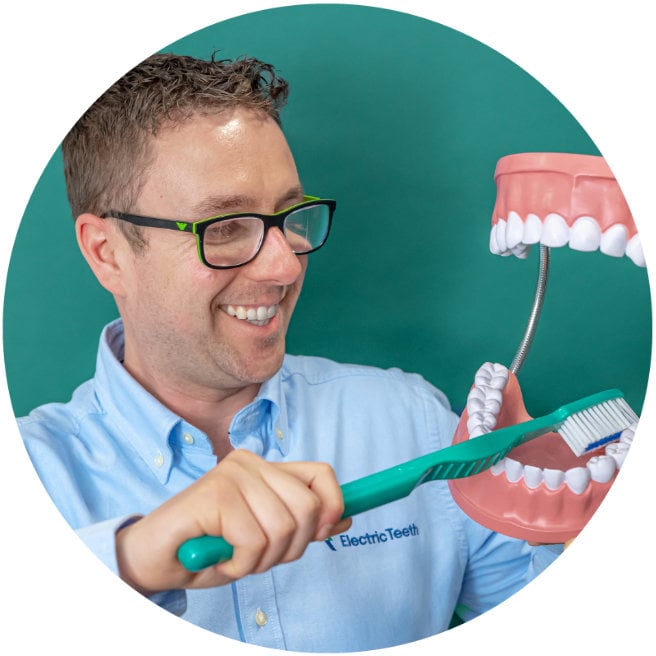
I found with toothbrushes I used that the performance of the brush head decreases with every use. After a week of using a brush head, a slight pressure on the bristles stops the movement of the head. The oscillating shaft in the handle is made of steel, but the moving parts in the head are plastic and wear out after a few minutes of use resulting in so much play that renders it useless after a couple of days. Do you know of a toothbrush that doesn't have this issue?
What brands/models of toothbrushes are you experiencing this issue with? This is not something I have had an issue with.
I call BS on this whole article because Coles sells s ten dollar version that is indistinguishable from my $100+ Braun, apart from not being rechargeable.
Hi Gareth,
Thanks for the comment. There are hundreds of different toothbrushes on the market. As much as we would like to, testing them all is an almost impossible task. So we have to come to the conclusions we do as best as we can. We are always trying new products and updating.
Please do share a link to the particular product you have so that we can consider it for the future.